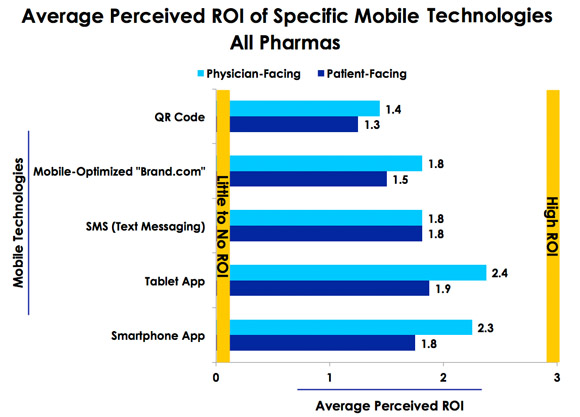Mobile Strategies for Pharma One Size Does NOT Fit All!Click Here for Additional Resources
Ryan McGuire, Research Team Leader, and Sarah Ray, Research Analyst, Cutting Edge Information (see Bios), join Pharmaguy to discuss top-level results of the “Pharmaceutical Mobile Health: Transforming Brand Marketing, Healthcare Communication and Patient Adherence” survey. Listen and learn how pharmaceutical companies are optimizing mobile health channels to better meet audience needs and to improve medication adherence, drug safety reporting, etc.
Aired live on: Wednesday, November 20, 2013
Check Out Business Podcasts at Blog Talk Radio with Pharmaguy on BlogTalkRadio
You also can visit this Pharma Marketing Talk Segment Page and listen to the archived audio podcast. This show and ALL Pharma Marketing Talk shows are available as podcasts via PMT on iTunes (FREE!).

Successful mobile strategies leverage the channels that are most compatible with audiences’ characteristics and available resources, according to a pharmaceutical marketing study by Cutting Edge Information.
The study, “Pharmaceutical Mobile Health: Transforming Brand Marketing, Healthcare Communication and Patient Adherence,” found that pharmaceutical and device companies need to understand each mobile platform’s benefit to optimize their channel usage and, ultimately, their mobile strategy.
An interviewed pharmaceutical executive advises that companies targeting communicable diseases in developing countries should develop strategies aimed at the widely available SMS platforms first. Cell phone access in developing regions is unlikely to contain capabilities beyond SMS messaging. However, smartphones or mobile-optimized websites may round out their mobile initiative arsenal in future efforts.
Findings from the mHealth study reveal that companies also need to dispel one-size-fits-all approaches when developing comprehensive mobile strategies. Within a mobile campaign that targets users attempting to quit smoking, for instance, text-based reminder initiatives may prove beneficial for some audiences but may not reach others. Instead, other users within the targeted group may benefit from a gamification platform or an information-based platform such as a mobile-optimized website. Given the variety of audience preferences, incorporating multiple channels to achieve a single objective is effective.
Companies might select a rewards-based initiative to achieve adherence goals before looking toward purely entertainment or information-based applications. The study includes best practices from companies that incorporated gamification strategies by generating rewards-based initiatives or by developing purely game-based initiatives. “The best outcome — rewards-based versus game-based — will be the strategy that meets target audience needs while reinforcing efforts toward the company’s objectives,” said Jason Richardson, president and CEO at Cutting Edge Information.
Some Questions/Topics Discussed
- Please describe how you did this survey and when. What was the methodology? How many and what types of companies participated?
- In what ways is mobile technology being used by pharma to improve adherence? What about gamification, rewards, etc.?
- It seems that pharma companies perceive that tablet and smartphone apps have a high return on investment (ROI) both in the patient and physician arena. But how is ROI measured? What are the major challenges in successfully launching a mobile campaign?
- Challenges developing mobile campaigns for both big and small pharmaceutical companies.
Guest Bios
 Ryan McGuire is a proud graduate of Rutgers University with a degree in finance. Born and raised in New Jersey, Ryan moved to North Carolina in 2008 to start a new career with Cutting Edge Information. Since joining CEI Ryan has led research projects in topic areas such as: clinical operations, patient recruitment, market access, medical affairs, digital marketing, drug safety, medical publications and medical information. His most recent benchmarking study on clinical trial costs launched in November.
Ryan McGuire is a proud graduate of Rutgers University with a degree in finance. Born and raised in New Jersey, Ryan moved to North Carolina in 2008 to start a new career with Cutting Edge Information. Since joining CEI Ryan has led research projects in topic areas such as: clinical operations, patient recruitment, market access, medical affairs, digital marketing, drug safety, medical publications and medical information. His most recent benchmarking study on clinical trial costs launched in November.
 Sarah Ray is a graduate of North Carolina State University with a B.S. in meteorology and a minor in English. She is also a proud alumna of Pi Beta Phi Women’s Fraternity. Since 2012, she has worked as a research analyst at Cutting Edge Information. Her time at Cutting Edge has led her to become involved with multiple projects ranging from clinical operations to marketing. More recently, she led a digital marketing study that is due to launch in 2014.
Sarah Ray is a graduate of North Carolina State University with a B.S. in meteorology and a minor in English. She is also a proud alumna of Pi Beta Phi Women’s Fraternity. Since 2012, she has worked as a research analyst at Cutting Edge Information. Her time at Cutting Edge has led her to become involved with multiple projects ranging from clinical operations to marketing. More recently, she led a digital marketing study that is due to launch in 2014.
Additional Resources
- “Pharmaceutical Mobile Health: Transforming Brand Marketing, Healthcare Communication and Patient Adherence” explores the burgeoning mHealth marketplace through qualitative best practices, detailed metrics and 10 real world mobile initiative case studies.









![6 Digital Tools at the Center of Healthcare Digitalization [INFOGRAPHIC]](http://ec2-54-175-84-28.compute-1.amazonaws.com/pharma-mkting.com/wp-content/uploads/2021/04/6DigitalTools_600px-100x70.jpg)




